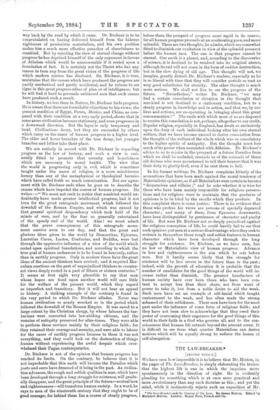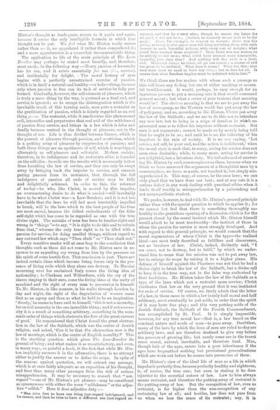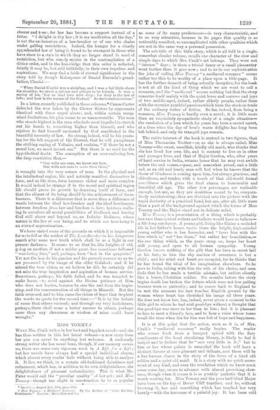THE LAW-BREAKER.*
[SECOND NOTICE.]
WE have seen how impossible it is to believe that Mr. Hinton, in the pages of The Law-Breaker, is simply elaborating the truism that the highest life is one in which the impulses move spontaneously in the direction of right. He is evidently pleading for something which is at once more practical and more :evolutionary than any such doctrine as this ; and yet the mind, while it instinctively rejects such an exposition of Mr.
• The Law-Breaker and the Coming of the Law. By Same Hinton. Edited by Margaret Hinton. London : Kegaa Paul, Trench and 0o. Hinton's thought as inadequate, recurs to it again and again. because it seems the only intelligible formula in which that thought can be pat. We feel what Mr. Hinton really means rather than see it, we apprehend it rather than comprehend it ; and a mere apprehension is a somewhat incommunicable thing.
The application to life of the main principle of The Law- Breaker may perhaps be stated most broadly, and, therefore, most easily, in the following way :—Every passion of humanity has its use, and it exists essentially for use (i e., service), and incidentally for delight. - The moral history of man begins with a perfectly unrestrained exercise of passion, which is in itself a natural and healthy—or holy—thing, because only when passion is free can its task of service be fully per- formed. Gradually, however, the self-element of pleasure, which is truly a mere thing by the way, is pursued as a final end, and service is ignored ; so to escape the disintegration which is the inevitable result of this turning aside, man pats a restraint on the gratification of passion, which is falsely regarded as an evil thing per se. The restraint, while it ameliorates this phenomenal evil, intensifies and perpetuates that real evil of the withdrawal of passion from service, and brings in a law which is false and deadly becanse centred in the thought of pleasure, not in the thought of use. Life is thus divided between license, which is the pursuit of pleasure through passion, and asceticism, which is a putting away of pleasure by suppression of passion ; and both these things are an apotheosis of self, which is worshipped alternately as self-pleasure and self-right. Modern society, therefore, in its indulgences and its restraints alike, is founded on the self-idea : its evils are the results which necessarily follow from forsaking the law of service, and they can only be swept away by bringing back the impulse to service, and emanci- pating passion from its restraints, that through the full indulgence of passion all ends of service may be fully and delightfully achieved. In order to this, the reformer of to-day—he who, like Christ, is moved by this impulse, an overmastering desire to do what is needed—will inevitably have to be what Christ was—a Law-Breaker ; and it is not less inevitable that the laws he will feel most irresistibly impelled to break, will be the laws which to the best people of his time are most sacred, because the. fullest embodiments of the false self-right which has come to be regarded as one with the true divine right. The mistake of man has been to localise right and wrong in "things "—to say, "It is right to do this and to refrain from that," whereas the only true right is to be filled with a passion for service, for doing needful things, without regard to any outward law which says "Thou shalt" or "Thou shalt not."
Every sensitive reader will at once leap to the conclusion that thoughts such as these did not come to Mr. Hinton save in re- sponse to an appealing cry wrung from him by the pressure on his spirit of some hostile fact. That conclusion is just. There are indeed certain ideas which become living forces only in the pre- sence of living evils which they alone can destroy. To Mazzini mourning over his enchained Italy comes the living idea of nationality ; to Clarkson and Wilberforce, with the cry of the slaves ringing in their ears, come the living ideas of the unity of mankind and the right of every man to possession in himself- To Mr. Hinton, in like manner, in his walks through London by day and night, the sight of the degradation of women came first as an agony and then as what he held to be an inspiration. 'Surely,' he seems to have said to himself, this is not a necessity, for an evil necessity is the one incredible thing ; and if not a neces- sity it is a result of something arbitrary, something in the man- made order of things which obstructs the flow of the great current of good.' He remembered that Christ found the great obstruc- tion in the law of the Sabbath, which was the centre of Jewish religion, and asked, 'Can it be that the obstruction now is the
law of marriage, which is the centre of English morality ?' This is the startling question which gives The Law-Breaker its
ground of being ; and what makes it so unsatisfactory, and even, in many ways, so painful a book, is the fact that while Mr. Hin- ton implicitly answers it in the affirmative, there is no attempt either to justify the answer or to define its scope. In spite of the reasons against quotation, we will extract one passage, which is at once fairly adequate as an exposition of his thought, and freer than many other passages from the risk of serious misapprehension. It may be necessary to remark that "not- regard "—one of Mr. Hinton's pet phrases—may be considered as synonymous with either the noun " selfishness " or the adjec- tive "selfish." Here it does adjective duty
"Man tries first to have one thing (not-regard indulgence), and he cannot, and then he tries to have a different one (not-regard re- straint), and that he cLianot also ; though he meant the latter for all good, it will not be En.. [Indeed, he honestly meant both to be for good.] Thus, for example, in respect to women : there was the giving so many to that great man the king, secluding them with such honour in such beautiful palaces, with every sort of delight; what could have seemed more exquisite ? Then there was one woman to be strictly to one man ; what could have seemed more honourable, beautiful, just, than that ? And nothing will do; each is a fresh evil. Whatever things he takes, all go one course ; a course of evil too great to be endured. What does it mean ? What but this : that man must have no need to have any thing; but be free for all. It means that what freedom implies must be achieved within him."
We think there are few readers with whom such a passage as this will leave any feeling but one of either mocking or mourn ful bewilderment. It would, perhaps, be easy enough for an ingenious person to put a meaning into it that would command general assent ; but what a series of poor truisms that meaning would be ! The obvious meaning is that we are to put away the law of monogamy, as the Western world has put away the law of polygamy, and as, according to Mr. Hinton, Christ pat away the law of the Sabbath ; and we are to do this not to introduce any new law, but to bring in a reign of freedom in which re- generated man is to follow his impulses without restraint. But man is not regenerate ; cannot be made so by merely being told that he ought to be so ; and until he is so, the following of his impulses is the ruin of society. It is no use saying, 'Let service, not self, be your end, and the action is indifferent,' when the moral state is such that, to many, acting for service does not seem even desirable ; while, to many more, acting for service is not delightful, but a laborious duty. We feel ashamed of answer- ing Mr. Hinton by such commonplaces as these, because when we think we have answered the argument of a thoughtful man by a commonplace, we have, as a rule, not touched it, but simply mis- apprehended it. This may, of course, be the case here ; we can only plead that we have done our best ; and at any rate it is a serious defect in any work dealing with practical ethics when it lends itself readily to misapprehension by a painstaking and not unsympathetic student.
We prefer, however, to deal with Mr. Hinton's general principle rather than with the special question to which he applies it ; for we cannot but feel that there is something thoroughly un- healthy in the gratuitous opening of a discussion which is for the present closed by the moral instinct which Mr. Hinton himself would admit to be most trustworthy—the instinct of those in whom the passion for service is most strongly developed. And with regard to this general principle, we would remark that the moral regenerators of whom Christ is the type—the realised ideal—are most truly described as fulfillers and discoverers, not as breakers of law. Christ, indeed, distinctly said, "I am come, not to destroy, but to fulfil," by which we under- stand him to mean that his mission was not to put away law, but to enlarge its scope by raising it to a higher plane. His defence of himself against the Pharisees was not that he had a divine right to break the law of the Sabbath, but a divine call to keep it.in the true way, not in the false way authorised by their traditions. Mr. Hinton takes the law of the Sabbath as a type of the laws which put a restraint upon service ; Christ vindicates that law on the very ground that it was instituted for ends of service. Of course, we freely admit that the letter of a law, in those cases in which a law is only half moral and half arbitrary, must eventually be put aside, in order that the spirit of it may have free play ; and this very putting aside of the Jewish Sabbath, the Sabbath of the Fourth Commandment, was accomplished by St. Paul. It is simply impossible, however, for any true moral law—that is, a law based on the constant nature and needs of man—to pass away. Doubtless, many of the laws by which the lives of men are ruled to-day are arbitrary laws, and are therefore destined to give way before the pressure of growing life; but surely some are in the truest sense moral, natural, inevitable, and therefore final. Man, though heir of the ages, enters into a poor inheritance if the ages have bequeathed nothing but provisional generalisations which are worn out before he comes into possession of them.
Mr. Hinton's view of the ideal life of man as a life in which impulse is perfectly free, because perfectly healthy and righteous, is, of course, the true one ; but even in stating it he does injustice to the essential nature of law. Law to him always means restraint, and therefore the putting-away of restraint is tha putting-away of law. But the recognition of law, even as restraint, is far higher than the non-recognition of any restraining law at all; and besides, law does not pass from us when we lose the sense of its restraint ; nay, it is clearer and truer, for law has become a support instead of a fetter. "I delight in thy law ; it is my meditation all the day," is not the exclamation of a law-breaker or of one who chafes under galling resbictions. Indeed, the hunger for a clearly apprehended law of being is found to be strongest in those who have risen to a state in wh'ch they no longer stand in need of restriction, but who simply rejoice in the contemplation of a divine order, and in the knowledge that this order is reflected, faintly it may be, but still faithfully, in their own impulses and aspirations. We may find a fable of eternal significance in the story told by Joseph Kalonymos of Daniel Deronda's grand- father, Charisi :—
"When Daniel Charisi was a stripling, and I was a lad little above his shoulder, we made a solemn vow always to be friends. It was a saying of his, Let us bind love with duty ; for duty is the law of Jove; and Law is the nature of the Eternal.' So we bound ourselves."
In a letter, recently published in these columns,* Canon Carter defended the vow taken by the Clewer Sisters by arguments identical with those urged above; and, within certain recog- nised limitations, his plea seems to us unanswerable. The man who stands highest is the man who feels most impelled to stretch out his hands to something higher than himself, and who rejoices to find himself environed by God manifested in the beautiful necessity of law. So strong, indeed, will be his yearn- ing for the felt support of die Eternal, that he will paraphrase the striking saying of Voltaire, and exclaim, "If there be not a moral law, we must invent one." But there is no need for the hypothetical doubt. The conception of an ever-enduring law, the deep conviction that,—
" Our wills are ours, we know not how, Our wills are ours to snake them thine,"
is wrought into the very nature of man. In the physical and the intellectual region, life and activity manifest themselves in form, and as life rises, form becomes richer and more complex. It would indeed be strange if in the moral and spiritual region life should prove its growth by denuding itself of form, and that the climax of its being should be the achievement of form- lessness. There is &difference that is more than a difference of words between the ideal law-breaker and the ideal law-keeper,
between freedom front law and freedom in law ; between realis- ing in ourselves all moral possibilities of Godhead, and having
God still above and beyond us, an Infinite Holiness, whose nature is the law of our being, and to which our true being is an eternal approximation.— -- We have stated some of the grounds on which it is impossible for us to folbw the author of The Lzw-Breaker in his dangerous search after some new truth which shall be as a light in our present darkness. It seems to us that he, like knights of old, goiag on another, if not a nobler quest, has sometimes followed " wandering fires," and, perhaps, been "lost in the quagmire."
Yet not the less do his passion and his pursuit possess us as we are possessed by the image of the older Galahad ; and if he missed the tree vision, as we believe he did, he certainly did not miss the true inspiration and aspiration of human service. Sometimes, perhaps, his faith failed, and he was tempted to make haste,—to rebel against the Divine patience of Bina who does not hasten, because he sees the end from the begin- ning, and the consummation of all things in Himself. But the faith returned, and to him came the vision of hope that inspired the words we quote for the second time :—" It is by the failure of some that others succeed; and through my very foolishness, perhaps, there shall come a better success to others, perhaps more than any cleverness or wisdom of mine could have wrought."




































 Previous page
Previous page